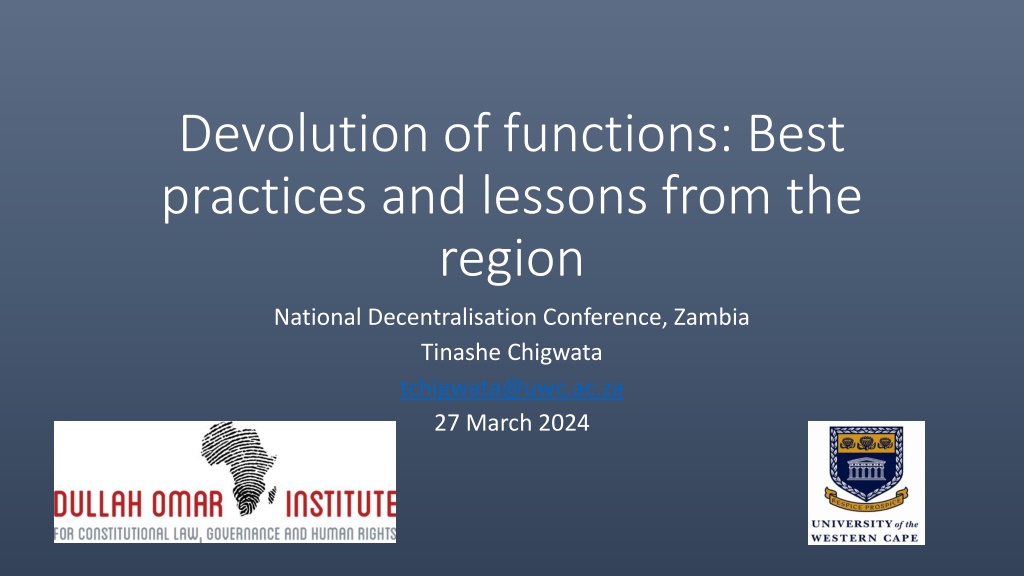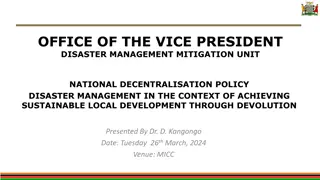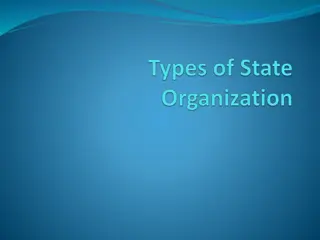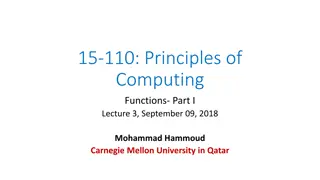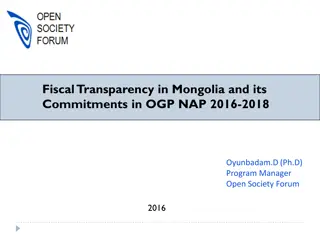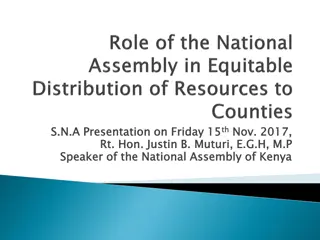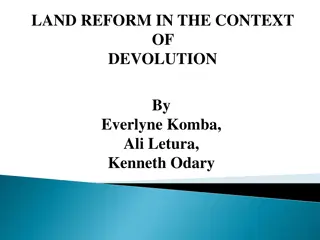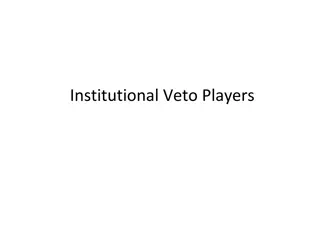Devolution of Functions: Best Practices in Subnational Governance
Understanding the importance of function assignment (FA) in subnational governance is crucial for effective decentralization. By learning from other countries and adopting a progressive FA framework, subnational governments can better achieve local, national, and sustainable development goals. The potential of subnational governments lies in their autonomy and responsiveness, which are key factors in successful functional assignment processes.
Download Presentation

Please find below an Image/Link to download the presentation.
The content on the website is provided AS IS for your information and personal use only. It may not be sold, licensed, or shared on other websites without obtaining consent from the author. Download presentation by click this link. If you encounter any issues during the download, it is possible that the publisher has removed the file from their server.
E N D
Presentation Transcript
Devolution of functions: Best practices and lessons from the region National Decentralisation Conference, Zambia Tinashe Chigwata tchigwata@uwc.ac.za 27 March 2024
Why learn from others? Why learn from others? Increasingly, countries across the globe are facing similar problems The search for development, responsive service delivery, national integration is common Article 151(2) speaks to this Attempts at resolving problems through constitutional reforms Many of the recent constitutions entrench devolution Under these circumstances, it makes sense to study the experiences of other countries to find solution to our national problems
The potential of subnational governments The potential of subnational governments Subnational governments are central to the achievement of local, national and sustainable development goals The process of functional assignment is about bringing subnational governments to the fore to pursue these objectives The nature of functions and the manner in which the functions are dispersed to the subnational level is key if subnational governments are to live to their potential Two critical conditions: subnational autonomy and responsiveness
What is function assignment (FA)? What is function assignment (FA)? A functional area Authority of power over a defined subject matter or area FA is both a process and outcome of the process Deciding who does what so that finance can follow function It is about the vertical division of powers and functions in a state Why is FA important? A poor FA framework can stand in the way of effective decentralisation Hence the need for a rational approach to FA
What does a progressive FA framework look What does a progressive FA framework look like? like? It is coherent It is feasible taking technical, managerial and financial capacities into account It is understandable and supported by key stakeholders National and subnational actors, non-state actors etc It is stable and predictable It can be assessed and adjusted
Extent of FA (re)structuring Extent of FA (re)structuring The experiences of various countries when it comes to FA processes is hardly documented and made available Developing countries FA is often about broader public sector reforms aimed at decentralising the state It is about redesigning the state South Africa, Kenya, Indonesia Developed countries They have a longer experience with subnational governments FA is often about modest revisions to existing arrangements to address fiscal inefficiencies, for example Often sector specific
Legal frameworks for FA Legal frameworks for FA The higher the instrument the more the stable and credible the FA framework but the higher the inflexibility Should legal instrument to effect FA have the same weight across sectors? A different legal regime gives unequal opportunities to effect change across sectors It creates an imbalance in the system Omnibus legal instrument more coherence and comprehensiveness Easier for the public to apprehend but difficult to change as the instrument often balances interests across government agencies
Moving from Moving from centralisation centralisation to to decentralisation decentralisation The challenge of selecting the right decentralization modality? Functions previously carried out by deconcentrated bodies are transferred to subnational governments through delegation and devolution Sometimes the migration happens between delegation and devolution In Namibia, delegation is seen as a stepping stone to devolution Gives an assurance to the centre since the central government retains considerable influence over the process + enables the development of local capacity Some do not recommend this approach The nature of function should inform the selection of the modality Excuse to keep power centralised In South Africa- preference for delegation and agency to transfer additional functions to local government reduces local governments to mere implementers and exposes them to unfunded mandates
Pace and sequencing of decentralisation Pace and sequencing of decentralisation reforms reforms Should the decentralisation/FA process undertaken rapidly or incrementally? Bing bang approach South Africa, Kenya, Nepal, Indonesia A rushed approach with corrective measures taken later building the car while driving it Incrementally Ghana, Zimbabwe. Zambia? A more gradual, stage, context tailored process allows the building of capacity to undertake assigned functions the window of opportunity to undertake significant and comprehensive decentralisation reforms will not always remain open Each country determines its own path what is feasible politically?
The practice of FA The practice of FA FA is not often given the immediate/significant attention The hard decisions on which level should be entrusted with which function are often avoided or delayed The reform process is often centrally (exclusively) driven Central institutions often dominates the process, sideline subnational governments How will other stakeholders influence the FA process? Lack of consensus among central institutions on the desired extent, process and pace of reform It is rare to find everyone in favour of the reform process Political and institutional culture of centralised governance Deliberate (in)action to slow/stop the reform process A deeper understanding of the political economy is required Develop a FA reform agenda that speaks to the context
Getting FA right Getting FA right Many countries have struggled to get it right -South Africa, Kenya, Indonesia, Zimbabwe, Cambodia Partial decentralisation Selling deconcentralisation as devolution or giving appearance of pursuing devolution legal contradictions/fragmentation between the sectoral laws, the Decentralisation Policy, primary local government laws and the Constitution Absence of reorgnisation in national ministries to reflect planned or ongoing decentralisation efforts Decentralise functions but control/withhold the finances and procurement decisions Imbalance between revenue and expenditure assignments, unfunded mandates etc
How do you deal with an unclear FA scheme? How do you deal with an unclear FA scheme? 1) Clarify through legislation Where a (sub)sector is shared, work out the assignment detail so that each level of government is left with its own function(s) within the (sub)sector 2) Judicial interpretation Bottom up approach to interpretation of functions -SA 3) Implementation protocols agreements to guide implementation 4) Effective coordination
Critical success factors Critical success factors 1) Willingness of the central government to accept devolution Difficult to reconfigure the state without a willing centre 2) Capacity to manage devolution Lack of capacity at the centre can be a problem and complicate implementation - Papua New Guinea Need for a decisive and forceful central government Technical and managerial capacity Incentives and sanctions 3) A carefully planned reform process Transitional machinery plans, laws and institutions Functional analysis 4) A one size fits all approach will not always work Diversity in capacity and spatial realities 5) Willingness of subnational governments to fully exploit local autonomy and assert themselves as real devolved units
Conclusion Conclusion FA is key to the success of any decentralisation programme It is a process of change with both supporters and opponents The need for political and administrative will at the highest level Take full advantage of a political window to undertake FA or finalise it The final decisions on FA often reflect difficult compromises, balancing of interests and power relations More money, better planning and effective coordination will not solve challenges that a poor FA framework will present Strive to get it right The process of FA is a journey assign, review and adjust
